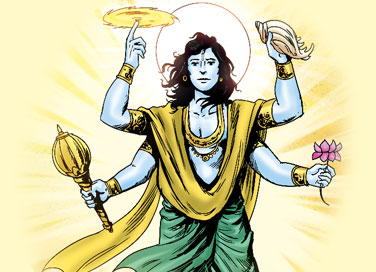Vishnu’s Kaumodaki Gada
- July 16, 2020


Vishnu’s Kaumodaki Gada
- July 16, 2020
Vishnu is often depicted holding a mace in his lower right hand. This divine weapon is known as the Kaumodaki gada.
Origin
To receive more such stories in your Inbox & WhatsApp, Please share your Email and Mobile number.
The name Kaumodaki is derived from the word ‘Kumuda‘ meaning ‘water lily’. The mace has always been associated with Vishnu. In the Mahabharata, Varuna, the god of the sky, is said to have given this mace to Krishna, before the burning of the Khandava forest.
Power and design
Its body is sometimes depicted with etchings of flutes and peacock feathers on it. The Kaumodaki has a thunder-like roar and the ability to kill all the Daityas, a clan of Asura along with the Danavas. The mace represents the power of knowledge, time and intellect.
Other information
The mace is sometimes personified as a goddess called Gadadevi or Gadanari. In this form, the mace is held by the goddess with Vishnu blessing her.
To receive more such stories in your Inbox & WhatsApp, Please share your Email and Mobile number.

Comic of The Month
The Naval Journey of India Book I
This book is the first of a three-book series that takes a deep and detailed look at India's Naval History and a deep insight into the lives of our men and women in white. But any series on the Indian Navy has to start at the very beginning - exploring India's celebrated maritime history. Join our little hero, Bharat, and his grandfather, Commodore Sagar, as they sail into the deep blue waters of time. Book I of The Naval Journey of India takes a sweeping look at India's maritime endeavours, how the seas impacted us over millennia and how the oceans made us who we are.